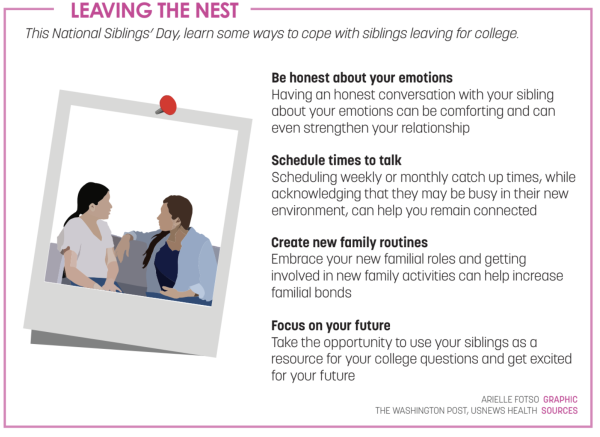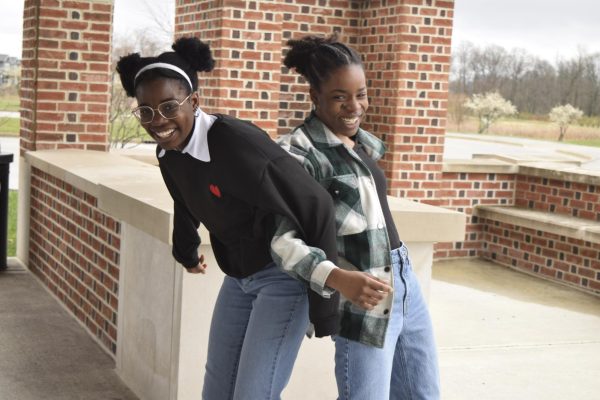Once again, that time of the year arrives. The end of the school year creates a sense of anticipation among seniors as they gear up for their new adventures. Concurrently, family dynamics shift as the realization of what’s to come dawns upon them. Sibling relationships, too, undergo subtle changes as older siblings go off into the world. This is especially the case for senior Abbie Uche-Ejekwu, as she will be attending college next year, leaving her 3 siblings behind.
“I am pretty close (with 1 of my sisters), since we’re 2 years apart. We were a lot closer when we were younger, but now we are less alike, since we have our own group of friends and are involved in our own activities. I’m a STEM kid, and she’s an athlete,” Uche-Ejekwu said.
Uche-Ejekwu is not alone. In light of Brother and Sisters day on May 2nd, the United States Census Bureau released data about growing numbers of siblings, as 4 out of 5 children in the United States have a sibling. What’s not reflected in these numbers are the obstacles siblings must face as older siblings move away from home.

For junior Grace Zheng, having a brother in college has greatly changed their sibling bond.
“I wouldn’t say (our relationship) is the epitome of close sibling relations. I feel like it’s very complicated. We are very polite with each other, but I wouldn’t necessarily call us close,” she said. “Because he’s in college, the physical distance between us contributes to our distance relations.”
Freshman counselor David Schleper said college relationships heavily depend on the relationships siblings have already established before one of them starts college.
“I know that some families have some rough sibling rivalries, and I know that sometimes (sibling relationships) actually improve because of a little bit of distance and space,” he said. “Sometimes distance actually brings (siblings) closer than before. That doesn’t happen all the time, but I think that does happen a good amount of times.”
Additionally, Uche-Ejekwu said she enjoys spending time with her little sister and talking about their common interests.
“We like to watch the same shows and play board games. (My sister) isn’t a big reader, but we do sometimes read the same books,” Uche-Ejekwu said.
Schelper said he agreed with Uche-Ejekwu’s perspective on doing things both siblings enjoy.
“I think one of the things (siblings) can do is find some sort of common ground. Whether that be activities, or whether it be what they enjoy watching on TV,” Scheleper said. “I know a lot of the time siblings butt heads and have different personalities and different lifes, but sometimes when they find a common ground that they can both agree on, I think that’s always a good thing that can help strengthen (sibling) relationships.”
However, Zheng said communication lacks in her relationship with her brother due to different interests.
“I don’t text him at all. I don’t know what’s going on with (his life) and he doesn’t know what’s going on (in my life),” she said. “We just don’t have too many things to talk about.”
Schleper also said sibling dynamics can affect larger family relationships and attitudes.
“The old phrase ‘You’re only as strong as your weakest link’ (applies here). If you have a family where one of the siblings is almost the firecracker of the family, then that can put a damper on a lot of things,” he said. “The behavior of one sibling can absolutely affect the attitude and dynamics of everyone else.”

(Avani Gupta)
Uche-Ejekwu said she hopes to keep a stable environment for her family, especially her siblings.
“I don’t think (our dynamic) is going to change too much. I’m going to try to keep (our family) environment the same, it’s just that I’m going to be away for some time, but I’m going to come back,” she said.
Zheng said she’s never been close with her family, so her brother leaving wasn’t a dramatic change to her life.
“I’m not close with my parents either, so I’m pretty independent and with my brother gone that just means I’m more independent,” she said. “I think my relationship with my family and brother is fine, all things considered.”
Additionally, Schleper said siblings need to reflect on their values and how they see their relationship progressing in the future.
“I think it’s all about perspective. I think that (siblings) need to realize what’s important in their life,” he said. “Looking in the long term, (siblings) have to think about if they want to have a relationship with (their sibling) not only now, but in 5 years from now, and 10 years from now. Highschool siblings right now are fighting over clothes or who drives the car. Ten years from now, (siblings) aren’t going to care who got the car that night or whatever. Hopefully, they will still like and love one another and have somewhat of a family bond.”
Zheng said, even though she’s not close with her brother at the moment, she misses spending time with him.
“He would help me with my homework, I miss that. When (my brother) was still living in our house, I could just run up to him and ask him questions and he could show me how to do it,” Zheng said. “This really helped because I like having things explained to me, and now that he is gone I’m not going to text him to ask for help.”
Uche-Ejekwu said she agrees with Zheng, and said she is going to miss her siblings, but hopes to keep in touch with them.
“I’m going to miss (my sister’s) energetic attitude, because I’m not energetic. I am also going to miss being in the same environment as my family,” she said. “However, I feel like even though I am going to be living at college, we will still have that connection.”
















































































![Review: “The Immortal Soul Salvage Yard:” A criminally underrated poetry collection [MUSE]](https://hilite.org/wp-content/uploads/2025/03/71cju6TvqmL._AC_UF10001000_QL80_.jpg)
![Review: "Dog Man" is Unapologetically Chaotic [MUSE]](https://hilite.org/wp-content/uploads/2025/03/dogman-1200x700.jpg)
![Review: "Ne Zha 2": The WeChat family reunion I didn’t know I needed [MUSE]](https://hilite.org/wp-content/uploads/2025/03/unnamed-4.png)
![Review in Print: Maripaz Villar brings a delightfully unique style to the world of WEBTOON [MUSE]](https://hilite.org/wp-content/uploads/2023/12/maripazcover-1200x960.jpg)
![Review: “The Sword of Kaigen” is a masterpiece [MUSE]](https://hilite.org/wp-content/uploads/2023/11/Screenshot-2023-11-26-201051.png)
![Review: Gateron Oil Kings, great linear switches, okay price [MUSE]](https://hilite.org/wp-content/uploads/2023/11/Screenshot-2023-11-26-200553.png)
![Review: “A Haunting in Venice” is a significant improvement from other Agatha Christie adaptations [MUSE]](https://hilite.org/wp-content/uploads/2023/11/e7ee2938a6d422669771bce6d8088521.jpg)
![Review: A Thanksgiving story from elementary school, still just as interesting [MUSE]](https://hilite.org/wp-content/uploads/2023/11/Screenshot-2023-11-26-195514-987x1200.png)
![Review: "When I Fly Towards You", cute, uplifting youth drama [MUSE]](https://hilite.org/wp-content/uploads/2023/09/When-I-Fly-Towards-You-Chinese-drama.png)
![Postcards from Muse: Hawaii Travel Diary [MUSE]](https://hilite.org/wp-content/uploads/2023/09/My-project-1-1200x1200.jpg)
![Review: "Ladybug & Cat Noir: The Movie," departure from original show [MUSE]](https://hilite.org/wp-content/uploads/2023/09/Ladybug__Cat_Noir_-_The_Movie_poster.jpg)
![Review in Print: "Hidden Love" is the cute, uplifting drama everyone needs [MUSE]](https://hilite.org/wp-content/uploads/2023/09/hiddenlovecover-e1693597208225-1030x1200.png)
![Review in Print: "Heartstopper" is the heartwarming queer romance we all need [MUSE]](https://hilite.org/wp-content/uploads/2023/08/museheartstoppercover-1200x654.png)




